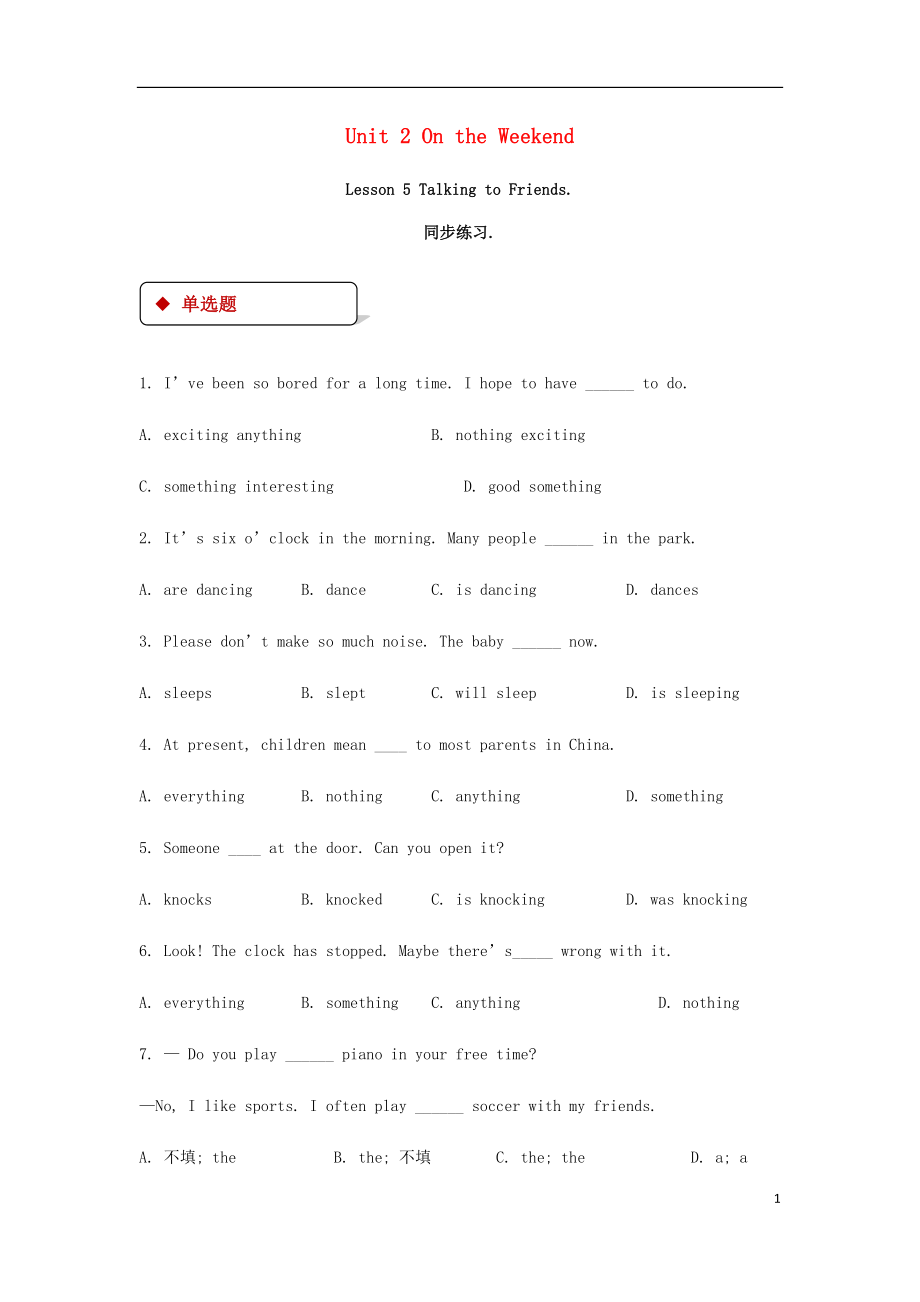《2018秋期七年級(jí)英語(yǔ)下冊(cè) Unit 2 On the Weekend Lesson 5 Talking to Friends同步練習(xí) (新版)北師大版》由會(huì)員分享���,可在線閱讀�,更多相關(guān)《2018秋期七年級(jí)英語(yǔ)下冊(cè) Unit 2 On the Weekend Lesson 5 Talking to Friends同步練習(xí) (新版)北師大版(3頁(yè)珍藏版)》請(qǐng)?jiān)谘b配圖網(wǎng)上搜索����。
1�����、
Unit 2 On the Weekend
Lesson 5 Talking to Friends.
同步練習(xí).
◆ 單選題
1. I’ve been so bored for a long time. I hope to have ______ to do.
A. exciting anything B. nothing exciting
C. something interesting D. good something
2. It’s six o’clock in the morning. Many people ______ in the
2�、park.
A. are dancing B. dance C. is dancing D. dances
3. Please don’t make so much noise. The baby ______ now.
A. sleeps B. slept C. will sleep D. is sleeping
4. At present, children mean ____ to most parents in China.
A. everything B. nothing C. anything D. something
5. So
3�����、meone ____ at the door. Can you open it?
A. knocks B. knocked C. is knocking D. was knocking
6. Look! The clock has stopped. Maybe there’s_____ wrong with it.
A. everything B. something C. anything D. nothing
7. — Do you play ______ piano in your free time?
—No, I like sports. I oft
4��、en play ______ soccer with my friends.
A. 不填; the B. the; 不填 C. the; the D. a; a
8. My host family tried to cook ________ for me when I studied in New Zealand.
A. different something B. different anything
C. something different D. anything different
參考答案
◆ 單選題
1. C 句意:我無(wú)聊好久
5��、了�����。我希望有有趣的事情做��。根據(jù)句意可知本句是希望做有趣的事���,表示肯定�,用something���;形容詞修飾不定代詞時(shí)�����,放在被修飾詞之后����。故選C�����。
2. A 句意:現(xiàn)在是早上六點(diǎn)鐘����。許多人在公園里跳舞。A. are dancing現(xiàn)在進(jìn)行時(shí)態(tài)形式����;B. dance一般現(xiàn)在時(shí)態(tài)形式;C. is dancing現(xiàn)在進(jìn)行時(shí)態(tài)形式��;D. dances第三人稱單數(shù)的一般現(xiàn)在時(shí)態(tài)形式��。本句指現(xiàn)在六點(diǎn)時(shí)����,人們正在做的事���,用現(xiàn)在進(jìn)行時(shí)態(tài)。people人們�����,是一個(gè)復(fù)數(shù)名詞���,be動(dòng)詞用復(fù)數(shù)are�����。故選A���。
3. D 句意:請(qǐng)不要發(fā)出那么多噪音。那個(gè)嬰兒現(xiàn)在生在睡覺(jué)��。根據(jù)時(shí)間副詞now可知此處用現(xiàn)在進(jìn)行時(shí)is s
6����、leeping,故選D��。
4. A 考查不定代詞。句意:目前在中國(guó)���,孩子對(duì)大多數(shù)家長(zhǎng)而言意味著一切��。everything意為“每件事,一切”����;nothing意為“沒(méi)有什么”;anything意為“任何事”�,多用于否定句或疑問(wèn)句中;something意為“某事”����,常用于肯定句中。故選A��。
5. C 句意:有人在敲門(mén)�。你能開(kāi)一下嗎?本題考查動(dòng)詞時(shí)態(tài)���。根據(jù)句意可知應(yīng)用現(xiàn)在進(jìn)行時(shí)�����,故答案為C項(xiàng)�����。
6. B 本題考查 something���,anything����,nothing�,everything的區(qū)別。結(jié)合句意可知�,表已經(jīng)停了,可能它出故障了�����。根據(jù)“there’s something wrong with…”的結(jié)構(gòu)可知所缺的詞是something�。
7. B play后接表示球類運(yùn)動(dòng)的名詞時(shí),球類運(yùn)動(dòng)名詞前不加任何冠詞����;play后接樂(lè)器名詞時(shí)必須加定冠詞the。piano意為“鋼琴”���,屬于樂(lè)器名詞����,前面要用定冠詞the;soccer意為“足球”��,屬于球類名詞�,前面不加冠詞,故選B��。
8. C 形容詞修飾不定代詞時(shí)要后置����,而且本句為肯定句�����,故選C�。
3
 2018秋期七年級(jí)英語(yǔ)下冊(cè) Unit 2 On the Weekend Lesson 5 Talking to Friends同步練習(xí) (新版)北師大版
2018秋期七年級(jí)英語(yǔ)下冊(cè) Unit 2 On the Weekend Lesson 5 Talking to Friends同步練習(xí) (新版)北師大版

